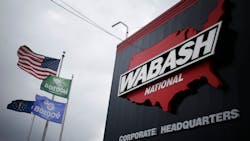Wabash profits rise in 'most difficult' manufacturing environment
Wabash National Corp. posted better than expected profits in the second quarter, amid “the most difficult external environment I've seen in my career,” President and CEO Brent Yeagy reported Wednesday.
Net sales for the second quarter totaled $449.4 million, a 32.5% increase versus the prior year quarter, as the company continued “to scale its ability to serve strong customer demand.” Consolidated gross profit was $55.6 million, or 12.4% of sales, according to the earnings statement. Operating income was $22.7 million.
Total company backlog as of June 30 was approximately $1.3 billion. Normal seasonal order patterns generally dictate that the backlog declines sequentially in Q2, the statement noted. However, during the second quarter of 2021, the backlog softened less than usual and remained up 77% compared to June of 2020.
“While the manufacturing environment continued to be broadly challenging during the second quarter, Wabash National is successfully navigating the issues created by labor scarcity and material cost increases compounded by exceptionally strong demand in our industry and in the economy as a whole,” Yeagy said.
Regarding finding and hiring workers, “the name of the game in 2021 is perseverance,” Yeagy added during a conference call with investment analysts.
Although material costs and supply chain performance remain “headwinds,” Yeagy noted, the ongoing implementation of a new organizational structure, One Wabash, better positions the company to react than in past cycles.
“We're also having difficult but necessary conversations with our customers about recovering cost increases throughout our backlog, and we continue to work to mitigate the impact of cost increases in other ways,” he said.
Regarding market conditions, indicators continue to show “the underpinnings of a very strong set up” for ongoing freight activity, Yeagy noted.
“As a result, those spot and contract rates reside at very favorable levels for our customers and seem likely to remain well into 2022,” he said.
Additionally, Wabash has named Dustin Smith to the newly created position of chief strategy officer, a role designed to accelerate the company’s pursuit of innovative technologies, and to expand and increase the velocity of product development activities.
Business segments
Commercial Trailer Products net sales for the second quarter were $296.3 million, an increase of 27.6% as compared to the prior year quarter, as operations scaled to meet improved customer demand. Operating income was $32.3 million or 10.9% of sales. The CTP unit shipped 11,090 trailers for the quarter, up from 8,000 the year before.
Diversified Products net sales for the second quarter were $76.6 million, an increase of 19.7%, as operations worked to ramp up. Revenue in this business was impacted by the divestiture of the Beall brand of tank trailers on Dec. 31, 2020. Operating income was $5.8 million, or 7.6% of sales during the quarter. The unit shipped 500 trailers in the quarter, up from 400 in the 2020 quarter.
Final Mile Products net sales for the second quarter totaled $81.0 million, an increase of 59.4% as compared to the prior year, as operations scaled to be able to satisfy stronger market demand. Operating loss was $3.2 million during the quarter while adjusted segment EBITDA improved to $1.3 million.
See additional coverage in the August issue of Trailer/Body BUILDERS magazine.
About the Author
Kevin Jones
Editor
Kevin has served as editor-in-chief of Trailer/Body Builders magazine since 2017—just the third editor in the magazine’s 60 years. He is also editorial director for Endeavor Business Media’s Commercial Vehicle group, which includes FleetOwner, Bulk Transporter, Refrigerated Transporter, American Trucker, and Fleet Maintenance magazines and websites.
Working from Beaufort, S.C., Kevin has covered trucking and manufacturing for nearly 20 years. His writing and commentary about the trucking industry and, previously, business and government, has been recognized with numerous state, regional, and national journalism awards.

